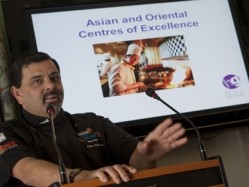Asian and Oriental restaurateurs welcome cuisine training centres, warn it won't solve immigration cap problems

The Minister for Further Education, Skills and Lifelong Learning, John Hayes MP, launched the five Asian & Oriental Centres of Excellence at Westminster Kingsway College, one of the venues offering the six week pre-employment programme which will include training and work experience.
The programme will be offered in colleges with a specialist knowledge of Asian and Oriental cuisine and will also teach general hospitality skills and career options to unemployed people. At the end of this programme the students are also guaranteed an interview for a job or paid apprenticeship with an employer working in in Indian, Bangladeshi, Chinese or Thai cuisine.
Leading industry bodies representing Asian and Oriental caterers will help recruit employers to the programme. Chef proprietor of Café Spice Namaste in London, Cyrus Todiwala, is already on board, welcomed the announcement and said he supported it totally but told BigHospitality the centres were a solution to the skills shortage in years to come, but the problem remained in the short-term.
"The initiative is great - it is about time that something like this happened. It maybe will be an eventual solution but not a short-term fix. It can have an impact, maybe a few years down the line, if it continues and if the Government does not pull its funding," he said.
Curry colleges
The Government's new rules on immigration, which came into effect in April 2011, only permit skilled chefs paid at least £28k to be recruited from outside Europe and the European Economic Area (EEA).
Launching the scheme, created by the newly-formed Hospitality Guild and sector skills council People 1st, Hayes said his ambition was for British-born chefs to fill many of the roles in the Asian and Oriental restaurant sector. Hayes was echoing comments from The Recruitment and Employment Confederation (REC) and his colleague Eric Pickles, the Communities and Local Government Secretary, who has previously stated his aim for so-called 'curry colleges' to train British nationals.
The Government Department for Business, Innovation and Skills awarded £1.75m to the Hospitality Guild which helped fund the initiative.
Todiwala said the problem remained that many British-born young people were not as keen to work in the industry than their overseas counterparts, a problem that he said was not limited to the Asian and Oriental sectors. Referring to his latest venture at Heathrow Airport, Todiwala said the majority of the workforce were Indian and he could not find British-born talent to fill roles there as many employees did not want to work their way up the ladder and had too high expectations.
The need remained, Todiwala said, for a short-term fix to the immigration cap as many of the Indian graduates who speak English and fit the new criteria may not be right for his business. One solution, he suggested, was to allow employers to continue to take on some un-skilled workers but ensure they learn English and get trained.
"I want somebody who is trained and the person who you can get trained doesn't speak English but he can cook beautifully. If the Government put an onus on the employer and said, 'it is your job to train them and make them amalgamate into society', anyone can do that," he said.
Blank sheet
Speaking to BigHospitality after the event, Hayes denied the creation of the centres was directly linked to the immigration cap policy and said it was right to give young British-born Asians the chance to develop skills in an industry they may not have previously considered. Hayes added that this scheme was driven by businesses and work had already begun on filling shortages through apprentices - a relatively inexpensive but productive option for restaurants.
"We are not starting with a blank sheet of paper are we? We are here planning for next year, the year after and so on. The initial courses are relatively short and can begin straight away so we can begin from now to begin to get new people in the industry. The follow-through won't be excessively long so I would see returns on this happening really very quickly," he said.
Asian & Oriental restaurants currently account for 19 per cent of all VAT registered restaurants in the UK. The initiative will be available as a pilot-model in Westminster Kingsway College, Leeds City College, Trafford College, the University of West London and University College Birmingham with plans for a possible rollout to similar centres in the future.










